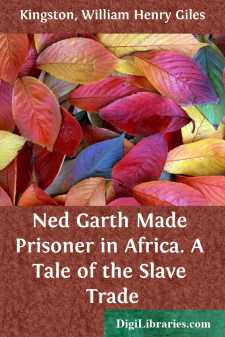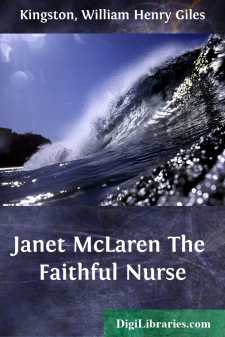Categories
- Antiques & Collectibles 13
- Architecture 36
- Art 48
- Bibles 22
- Biography & Autobiography 813
- Body, Mind & Spirit 142
- Business & Economics 28
- Children's Books 15
- Children's Fiction 12
- Computers 4
- Cooking 94
- Crafts & Hobbies 4
- Drama 346
- Education 46
- Family & Relationships 57
- Fiction 11828
- Games 19
- Gardening 17
- Health & Fitness 34
- History 1377
- House & Home 1
- Humor 147
- Juvenile Fiction 1873
- Juvenile Nonfiction 202
- Language Arts & Disciplines 88
- Law 16
- Literary Collections 686
- Literary Criticism 179
- Mathematics 13
- Medical 41
- Music 40
- Nature 179
- Non-Classifiable 1768
- Performing Arts 7
- Periodicals 1453
- Philosophy 64
- Photography 2
- Poetry 896
- Political Science 203
- Psychology 42
- Reference 154
- Religion 513
- Science 126
- Self-Help 84
- Social Science 81
- Sports & Recreation 34
- Study Aids 3
- Technology & Engineering 59
- Transportation 23
- Travel 463
- True Crime 29
William Henry Giles Kingston
William Henry Giles Kingston was a 19th-century English writer known for his adventure novels for boys. Born on February 28, 1814, in London, he authored numerous popular works, including "Peter the Whaler" and "The Three Midshipmen." Kingston's engaging stories often drew on maritime themes, reflecting his interest in sea adventures and exploration.
Author's Books:
Sort by:
Chapter One. Just come from India. “Are they really coming to-morrow, granny?” exclaimed Fanny Vallery, a fair, blue-eyed, sweet-looking girl, as she gazed eagerly at the face of Mrs Leslie, who was seated in an arm-chair, near the drawing-room window. “Oh, how I long to see papa, and mamma, and dear little Norman! I have thought, and thought so much about them; and India is so far off it seemed...
more...
“Can you make her out, Ned? My eyes are not so sharp as they used to be, and I lost sight of the craft when came on.” “She has tacked, uncle; I see her masts in one, and she’s standing to the westward.” “I was afraid so; she must be a stranger, or she would have kept her course. She’ll not weather the head as she’s now standing, and if it doesn’t clear and show her the land, she’ll...
more...
Story 1—Chapter 1. The Miller of Hillbrook. There are all sorts of mills: some go by water, undershot or overshot; but if the millpond is dry, or the stream runs low, they come to a standstill. They want help, they must have water, to go on. Next there are steam-mills, which make a great noise and do a great deal of work; but they want coals and water too: if both are not brought to them, they stop...
more...
Chapter One. “What shall we do with ourselves, my dear Stilkin?” exclaimed Count Funnibos, yawning and stretching out his legs and arms, which were of the longest. “Do! why, travel,” answered Baron Stilkin, with a smile on his genial countenance. “Travel! what for?” asked the Count, yawning again. “To see the world, to be sure,” answered the Baron. “The world! why, don’t we see it...
more...
The Settler’s Early Days. From my earliest days to the present time I have been gradually climbing up the ladder towards a comfortable berth on the top; and if a ratlin has given way beneath my feet, I always have had a firm hold above my head. The first step I took was off the mud on to dry ground. I can recollect nothing clearly before that time. I was born on board a river barge, and never left...
more...
I go to sea in rather unromantic surroundings. Have any of you made a passage on board a steamer between London and Leith? If you have, you will have seen no small number of brigs and brigantines, with sails of all tints, from doubtful white to decided black—some deeply-laden, making their way to the southward, others with their sides high out of the water, heeling over to the slightest breeze,...
more...
The Indiaman. “Well, Thudicumb, I hope by noon we may at last get a glimpse of the sun,” said Captain Davenport to his first officer, as they walked the deck of the Bussorah Merchant, homeward bound from the East Indies, and at that time rolling on over the long heaving seas of the Atlantic. The sky was overcast, but ever and anon a gleam of light burst forth amid the clouds, playing on the foaming...
more...
Archibald Hughson, a young Shetland lad, having a strong desire to go to sea, and his mother withholding her consent, determines to run from home.—He is treacherously assisted by Max Inkster, a wicked sailor, who succeeds in getting him stowed away on board the “Kate,” a Greenland whaler. “Where are you going, Archy?” asked Maggie Hughson, as she ran after her brother, who was stealing away...
more...
The home of my childhood in South America—My father’s history—Sent to school in England—Life at school—Summoned back to America—Voyage with my uncle to Jamaica—Sail for Venezuela—Chased by a Spanish man-of-war—Cross the bar of the Magdalena River—Driven on shore by a storm—Boat nearly wrecked—Our night encampment—Repair boat—A deer shot—Disturbed by Goahira...
more...
Donald Morrison, whose wife has lately been called away, dying in his Highland Manse, his Children left destitute, are taken care of by their old nurse.—She conveys them to a sea-side town, where she takes up her abode with them in a small attic, and labours for their maintenance, while she places the two boys, Donald and David, at school.—Her anxiety about the education of Margaret. In his...
more...











